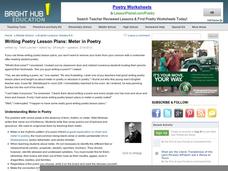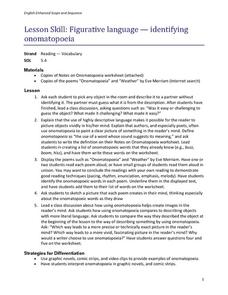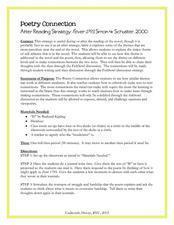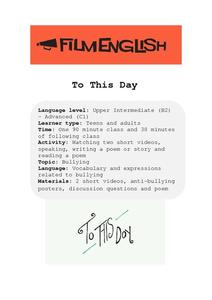Curated OER
Writing a Halloween Poem
A delightful lesson on poetry is here for you and your middle schoolers. Learners are instructed to write a Halloween poem. They get to choose the age range for the audience of the poem. So, it may be scary (for older kids), or humorous...
Hawaiʻi State Department of Education
Picture Poetry
What a fun idea! The class discusses, and then writes free-verse poems using sensory detail. They get into small collaborative writing teams to compose their poems. Next, they pantomime the actions from the poem while their teammates...
Curated OER
Meter in Poetry
A good poem has form and structure built into it. Middle schoolers see that the structure of a poem consists of stanza, form, rhyme, and meter. The structure also contributes to a poem's meaning. After listening to, and discussing, a few...
Curated OER
Figurative Language- Identifying Onomatopoeia
A study of onomatopoeia for 5th graders is here for you. Pupils discover that the use of highly descriptive language makes it possible for readers to picture objects in their minds. After engaging in a class discussion and listening to...
Curated OER
Bringing Household Items to Life
Use folk tales as inspiration for learning about and using personification in creative writing. Learners brainstorm together in order to practice personification before writing their own poems or paragraphs about a household object.
Curated OER
Collective Poetry: Teaching Tolerance
Help your class create collective poetry following a simple, engaging model from Teaching Tolerance (tolerance.org). Each young poet writes five things on an index card: sayings from others, favorite sound, favorite place, favorite...
Curated OER
The Learning Network: Poetry Pairing July, 21, 2011
Although not a complete lesson plan, this set of emotionally powerful texts could be used in a variety of lessons. From The New York Times' Learning Network site, the resource includes a poem, an excerpt from a New York Times article and...
Hawaiʻi State Department of Education
Poems That Dance
Combine the elements of dance with the actions in a poem. Learners review basic grammar, write an action-packed cinquain poem, and then choreograph a dance based on their cinquains. After the dances are done, they'll discuss the elements...
Curated OER
Mad-Libbing Your Way Into Modern Poetry
Use a Mad-Libs like activity to create modern poetry! Writers will identify different words and their parts of speech and study "The Red Wheelbarrow" by Williams Carlos Williams. Then, use the sheets attached to craft your own poem! An...
Curated OER
Poetry of The Great War: 'From Darkness to Light'?
Young scholars examine World War I poetry for historical context, poetic devices, and participate in a class discussion. They write an analysis of the poetry's form and its content.
Curated OER
Exaggerated Poetry
Students use physical poses and vocal choices to create emphasis in communication. In this exaggerated Poetry lesson, students use physical movement and vocal choices to exaggerate an expression make a connection between literary content...
Curated OER
Lincoln is in the House! ("Name-Dropping" Poems and the Power of Connotation)
“What’s in a name?” Just about everything. Barack Obama, Vincent van Gogh, Justin Bieber. Famous names evoke a multitude of reactions and poets often use the names of famous people in their works precisely because names carry...
Scholastic
Reading Poems From the Academy of American Poets Chancellors
Start a lesson on poetic voice with a peer to peer discussion on what characterizes the strength in the voice with which a writer chooses to express himself/herself. In pairs, readers are tasked with reading and creating T-charts for...
Scholastic
Selecting Favorite Poems From Historical Poets
Here is a poetry lesson that begins with a free-association activity focused on the word voice. Learners each sit alone for a moment and make sounds that express how they are currently feeling, and then turn to their partners to share...
Curated OER
Letters from Emily Dickinson: Letters and Poems
Students analyze how Emily Dickinson perceived herself as a poet. Students read correspondence between Dickinson and her preceptor, Mr. Higginson to determine the depths of their relationship. Students interpret several of her poems.
Scholastic
Sky
Lead your class through a writing exercise that explores personification. After listening to the teacher read a poem that personifies the sky, they go step by step through the writing their own personification poems.
Curated OER
Musical Poetry
Young scholars analyze lyrics of their favorite songs as examples of alliteration, metaphor, Onomatopoeia, personification, rhyme, and simile to determine the purpose of these devices in poetry. They use their analysis to create a...
Curated OER
Poetry Connection: After Reading Strategy for Fever 1793
“If you can meet with Triumph and Disaster/And treat those two impostors just the same. . .” After concluding Fever 1793 class members engage in a reading strategy that asks them to connect their thoughts about the self-reliance theme in...
Houghton Mifflin Harcourt
Walt Whitman: From Song of Myself
Looking for a resource that models how to read and analyze a poem? Check out this packet that uses sections of Walt Whitman's "Song of Myself" to demonstrate how to paraphrase, note literary elements, and identify the poet's inferences.
Curated OER
Figurative Language
Fifth graders identify and categorize figurative language in poetry.They read a poem and find an example of figurative language, then read the included hand-out on figurative language, and describe each type of figurative language. They...
Curated OER
Haiku Movies
Pupils create a movie to illustrate an original haiku poem in this upper-elementary school, Language Arts lesson utilizing technology. The lesson meets state standards for Language Arts and includes a materials list and possible lesson...
Curated OER
Deciphering the Mechanics of Poetry
After a review of poetic terms, groups are given an object and they create a poem using a simile, a metaphor, internal rhyme, end rhyme, alliteration, and personification. Groups then exchange objects and repeat the process. Consider...
Curated OER
Poetry SLAM: Youth Verse Competition
Use this model, based on urban youth poetry competitions, to create an engaging venue for your poets to share their work out loud, with expression. Build class community, have fun, and celebrate your authors' original verse. Resource is...
Film English
To This Day
Bring bullying out into the open with an involved lesson surrounding the animated version of Shane Koyczan's spoken word poem "To This Day." Class members discuss images related to bullying and watch the video without sound. They write a...

























